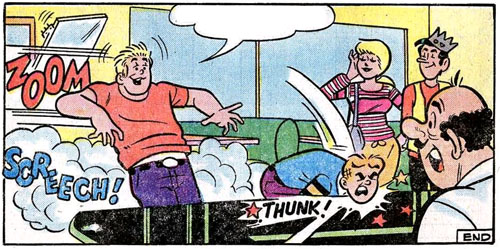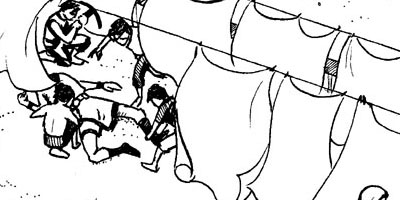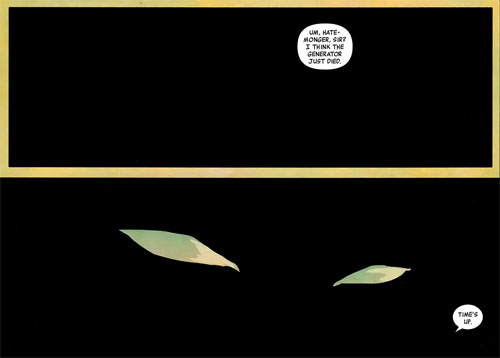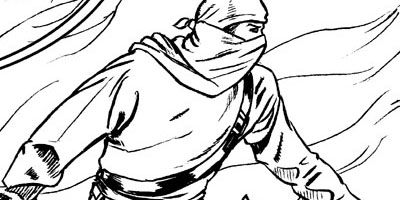(First, let me apologize for the lack of a post last week. My job is dealing with a whole bunch of new regulations that rolled out on September 1st, and I wound up working 57 hours that week to help out. Blogging kind of fell by the wayside as a result; normal service has resumed now that I’m down to a relatively sedate 50 or so. Now, on with the post!)
Recently, MGK said in one of his posts that ‘Flashpoint’ was the worst crossover since ‘Millennium’. I think this is a little unfair…to ‘Millennium’, an early crossover that should still probably count as more of a “fascinating failure” than a “flawed success”, but did and does have some things to recommend it. Compared to the ambition, energy, and the sheer work that went into “Millennium”, “Flashpoint” is exposed even more as the lazy, slapdash retread that it really is.
For those of you not familiar with “Millennium”, it went down like this. The Guardians of the universe, at that point in DC history, had left the universe to go make nookie with their female counterparts, the Zamarons. But they had announced that there would be a new race of Guardians to take their place, because the universe kind of needs them. “Millennium” opens up with one Guardian and one Zamaron showing up on Earth to announce that the new Guardians would arise from a group of ordinary human beings, and that they had come to find them and teach them about their new role in the scheme of things.
This isn’t a bad start to a crossover; it goes a long way towards explaining why the Guardians have taken three times as many Green Lanterns from one planet as they have from some entire sectors, and the idea of seemingly ordinary human beings who have a great cosmic destiny is a classic trope that can be well-handled. The actual people involved (the so-called “New Guardians”)…well, let’s give credit where it is due and point out that it was a real and earnest effort to create a racially diverse group of protagonists that included an openly gay man and a Muslim woman, two groups that are more underrepresented now than they were in a mid-80s crossover. But we should also admit that this was the mid-80s, that Steve Englehart’s attempts to inhabit the mindset of his ethnically diverse cast resulted in some painfully awkward stereotypes, and that the resultant superheroes were frequently and powerfully lame.
But of course, it wouldn’t be much of a comic-book crossover if there was no conflict, and this one had as its villains the Manhunters. I forget whether this was the point at which they revealed that all the Manhunters and the Manhunter organization and everything “Manhunteresque” was actually a front for a group of androids that were the Guardians’ first attempts at creating a universal police force, or if that had been known already and this was just where the Manhunters’ master plan was revealed. But basically, the Manhunters decided that they’d just seen off one group of Guardians, and the universe didn’t need another, and they were going to scuttle the attempt to create a new breed of Guardians before it started. And building off of the events of ‘Crisis on Infinite Earths’, they had found that sphere that Harbinger had recorded the entire history of the DC Universe on, which turned out to be kind of a bad thing for her to do on account of how she had used the Monitor’s technology to find out the secret identities of every superhero in the world.
This meant that the Manhunters had known for a long time who the Guardians would turn to in order to protect their successors, and had planted “sleeper agents” all over the world. So there were lots of shocking betrayals, as long-time supporting cast members turned out to be androids or traitors (or, in the case of Laurel Kent, an android traitor.) This was a pretty good idea for a dramatic story (at least, good enough that they would shamelessly rip it off in a couple of decades for “Infinite Crisis”), and it did give us one of the best crossover moments ever as Batman shows up in Commissioner Gordon’s office to tell him about the situation. He says as he’s climbing back out the window, “The Manhunters have placed sleeper agents all over the world,” and Gordon pistol-whips him across the back of the head, shoves him out the window, and says, “I know.”
This is followed up on in Batman’s own book, which is something else worth commenting on; after hearing comics fans’ complaints about two consecutive crossovers where the tie-ins were meaningless “red sky” issues that just had the logo on them to get completists interested, “Millennium” actually had events in the main series that were followed up on in that week’s actual comics. A major character’s death happened in one of the tie-ins, the heroes found out about the bad guys’ base in a tie-in, and basically the main series was just the spine of a much larger story. Which means that the “Millennium” trade paperback makes the series seem a lot worse than it was. It also gave comics fans a whole new area of complaint: “Why do I have to buy every single tie-in just to find out what’s going on?!?!?!?!?!?!”
In the end, “Millennium” did have a lot of problems. Booster Gold’s heel turn and subsequent betrayal of the bad guys is so ineptly handled that even the writers didn’t seem to know what side he was on (I actually asked; Englehart was firmly convinced that Booster Gold was cynically switching sides to whoever seemed most likely to win, while Dan Jurgens said that Booster was always a good guy and was playing the Manhunters for suckers by exploiting his reputation as a greedy cynic.) The actual New Guardians were incredibly stupid, both in their specific concepts and in the general idea that creating a new breed of Guardians of the Universe would result in just another super-hero team, and their series only lasted twelve issues. And a lot of the writing, in retrospect, feels clumsy and stilted. But it’s worth remembering that the tentpole crossover was in its infancy back then, and the writers and editors were feeling out a lot of the rules as they went along. There was a very real honesty to it that I admire, an attempt to really do something worthy of their readers’ time and money instead of just this year’s crossover, and it did a lot more right than it’s remembered for.
I somehow don’t think people will be saying the same thing about “Flashpoint” in 20 years.





